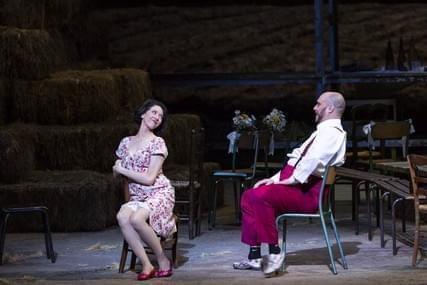Cast
| Nemorino | Vittorio Grigolo | |
| Nemorino | Paolo Fanale - Nov 10 | |
| Adina (Elisir) | Lisette Oropesa | |
| Belcore | Étienne Dupuis | |
| Dr Dulcamara | Gabriele Viviani | |
| Giannetta | Adriana Gonzalez |
Giacomo Sagripanti
ProductionLaurent Pelly
Set DesignerChantal Thomas
LightingJoël Adam
DirectorAgathe Mélinand
ChorusmasterAlessandro Di Stefano
About
About
It is a lost village in the Italian countryside. An inn on a road that sometimes crosses a dog. Nothing else. So goes the staging of Laurent Pelly. A landscape so desert that the droning arrival of Dr. Dulcamara is a sensation. And for good reason. It is said that he is the inventor of a mysterious love potion.
At the opera, the love potions sometimes provoke terrible tragedies. They can also be pretexts for this tender comedy where sergeant Belcore and timid Nemorino fight over the heart of beautiful Adina. The stage is set. In front of the music - which Donizetti composed in fourteen days!
Media
Lisette Oropesa Interview - Elisir
L'Elisir d'amore by Gaetano Donizetti (Lisette Oropesa & Vittorio Grigolo)
L'Elisir d'amore by Gaetano Donizetti (Lisette Oropesa & Gabriele Viviani)
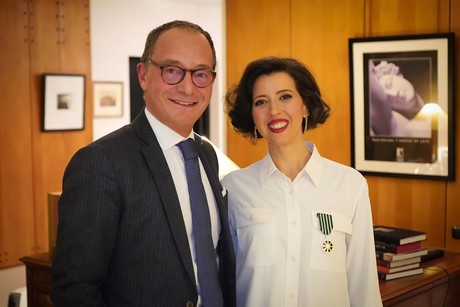
Chevalier de l’Ordre des Arts et des Lettres
Lisette is awarded the title of Chevalier de l’Ordre des Arts et des Lettres by the French minister of Culture.
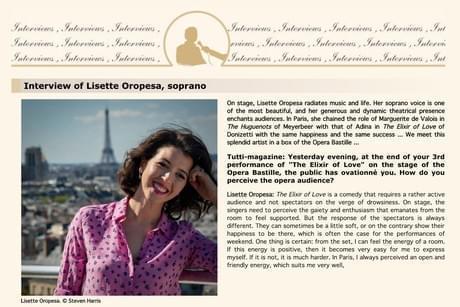
Tutti Magazine - Interview
Lisette Oropesa interviewed in Tutti Magazine

Opera Wire - 11 Singers who had a year to remember
OperaWire gives Lisette the #1 position on singers who had a year to remember for 2018!

Interview - Radio Classique
Lisette Oropesa is interviewed by Laure Mézan of Radio Classique

Interview - France Musique
Lisette Oropesa interviewed in France Musique

🍂 Fall Newsletter
Les Huguenots, L'elisir D'amore, Rigoletto

Interview - Ôlyrix
Lisette Oropesa interviewed in Ôlyrix
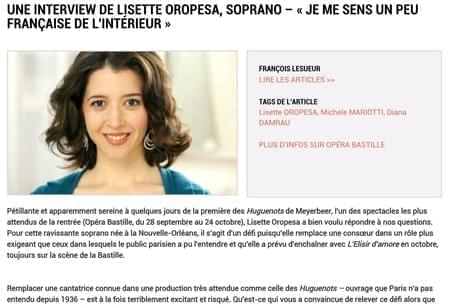
Interview - Concert Classic
Lisette Oropesa interviewed in Concert Classic

Interview - Toute la culture
Lisette is interviewed in Toute la Culture

Interview - Club de Opera
Lisette Oropesa interviewed in Club de Opera
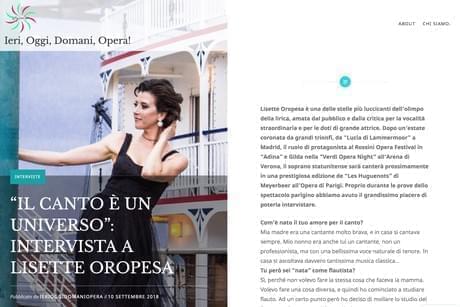
Interview - Ieri Oggi Domani Opera
Lisette Oropesa interviewed in Ieri Oggi Domani Opera

Interview - Rev Opera
Lisette is interviewed in Rev Opera
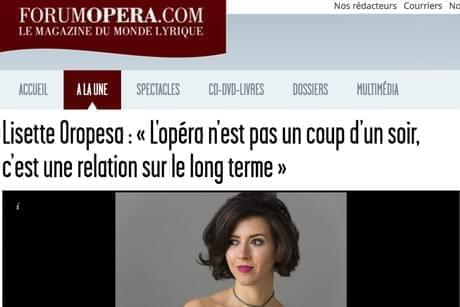
Interview - Forum Opera
Lisette is interviewed in Forum Opera
Reviews
L’Elixir d’amour de Pelly, réjouissance théâtrale à Bastille
24 heures après avoir chanté la dernière des neuf représentations des Huguenots (auxquels elle glisse une référence en proposant la « Reine Margot » lorsque Dulcamara cherche le nom d’Isolde), qui l’ont vu triompher (lire notre compte-rendu) en remplacement de Diana Damrau, la piquante Lisette Oropesa enchaîne avec la Première de l’Elixir d’amour, qu’elle a répété en parallèle (comme elle nous l’indiquait en interview). Pour autant, sa voix garde sa fraîcheur délicate dans le médium et sa finesse acidulée dans l’aigu. Son vibrato rapide et fin se module selon les intentions du personnage, accompagnant ainsi les nuances du chant. Elle garde une grande énergie sur scène, ne ménageant pas ses efforts, en femme volage et capricieuse, mais touchante dans le dénouement.24 hours after singing the last of nine performances of The Huguenots (to which she slips a reference by suggesting "Queen Margot" when Dulcamara is looking for the name of Isolde), which have seen her triumphant (read our review) in replacement of Diana Damrau, the spicy Lisette Oropesa continues with the premiere of the Elixir of Love, which she has rehearsed in parallel (as she told us in an interview). Despite this, her voice retains its delicate freshness in the medium and its tart fineness in the high register. Her rapid and fine vibrato is modulated according to the intentions of the character, thus accompanying the nuances of the song. She retains a great energy on stage, sparing no effort, as a fickle and capricious woman, but touching in the resolution.— Damien Dutilleul • Olyrix
L'elisir d'amore - Paris (Bastille)
Ses duos avec Adina sont de véritables moments de grâce tant la voix de la soprano s’accorde idéalement avec la sienne. Lisette Oropesa accomplit là un véritable exploit : hier encore elle incarnait une éblouissante Marguerite de Valois dans Les Huguenots et ce soir elle campe une Adina piquante et mutine à souhait sans aucune trace de fatigue dans la voix si ce n’est peut-être un aigu légèrement tendu en fin de soirée, peccadille au regard d’une incarnation en tout point captivante servie par un timbre radieux et une remarquable agilité vocale.His duets with Adina are genuine moments of grace as the soprano's voice ideally complements his own. Lisette Oropesa accomplishes a real feat here: just yesterday, she embodied a dazzling Marguerite de Valois in Les Huguenots, and tonight she portrays a spicy and mischievous Adina to perfection, without any trace of fatigue in her voice except perhaps a slightly strained high note at the end of the evening, a minor quibble in the face of an entirely captivating incarnation, served by a radiant timbre and remarkable vocal agility.— Christian Peter • Forum Opera
À la Bastille, les réjouissants pouvoirs de « L’Élixir d’amour »
La soprano Lisette Oropesa est en passe de devenir « la petite fiancée d’Amérique » pour le public de l’Opéra de Paris. Expression affectueuse suscitée par son charme juvénile, son jeu pétillant et le bonheur manifeste avec lequel elle exerce son art. Mais qui ne doit pas masquer une exceptionnelle technique vocale, une homogénéité remarquable de la tessiture – aigu cascadant, médium gouleyant et graves qui ne s’en laisse pas compter – et une endurance de marathonienne (ce qu’elle est, au sens propre du terme, par ailleurs) puisqu’elle a enchaîné Les Huguenots et L’Élixir sans faiblir…Soprano Lisette Oropesa is on her way to becoming "America's sweetheart" for the Paris Opera audience. This endearing term is inspired by her youthful charm, sparkling performance, and the evident joy with which she practices her art. Yet, this should not overshadow her exceptional vocal technique, the remarkable homogeneity of her range – with cascading highs, smooth mids, and resilient lows – and her marathon runner's endurance (which she is, in the literal sense, as well) since she has seamlessly performed in Les Huguenots and L'Élixir without showing any signs of faltering...— Emmanuelle Giuliani • La Croix
Avec « L’Élixir d’Amour », l’Opéra Bastille déroule le tapis rouge à Gaetano Donizetti
Le personnage d’Adina, riche et belle fermière, campé par Lisette Oropesa est pétillant à souhait. La soprano virevolte comme une elfe sur le plateau pleine de charme, de malice et fait des étincelles vocales dans le registre du belcanto.The character of Adina, a rich and beautiful farmer, portrayed by Lisette Oropesa, is delightfully vivacious. The soprano whirls around the stage like an elf, full of charm and cunning, and creates vocal sparks in the bel canto register.— Jean-Christophe Mary • Putsch Media
L’Élixir d’amour du docteur Pelly : euphorie garantie à l’Opéra de Paris
Avec son jeu scénique et vocal tout en finesse, celle qui a récemment mis Bastille à ses pieds dans Les Huguenots continue sur sa lancée. Timbre ardent, projection homogène sur toute la tessiture, vocalises agiles, aigus scintillants, Oropesa a pour elle tous les atouts… et elle en use avec élégance et facilité, jouant plus qu’elle ne chante.With her subtle stage presence and vocal performance, the artist who recently captivated the Bastille audience in "Les Huguenots" continues her momentum. With a passionate timbre, even projection across her entire range, agile vocal runs, and dazzling high notes, Oropesa possesses all the qualities... and she utilizes them with elegance and ease, acting more than she sings.— Tristan Labouret • Bachtrack
L'Elixir d'amour
De sa très belle voix de soprano, claire mais suave, la jeune américaine Lisette Oropesa campe une pétillante Adina, à l’opposé de son rôle de Marguerite de Valois dans Les Huguenots de Meyerbeer qu’elle vient tout juste de quitter. D’une grande précision dans la justesse, puissante dans tous les registres de sa tessiture, on la voudrait pourtant plus « capricieuse » vocalement, à l'image du personnage qu'elle incarne : le jeu de scène est là, parfait, mais la voix est parfois trop sage et manque un peu de nuances. On aurait souhaité que la chanteuse s'amuse davantage, quitte à prendre quelques risques, pour nous proposer différentes facettes de son organe vocal qu’elle maîtrise parfaitement, à n’en point douter.With her very beautiful soprano voice, clear yet mellow, the young American Lisette Oropesa portrays a sparkling Adina, a stark contrast to her role as Marguerite de Valois in Meyerbeer's Les Huguenots, from which she has just come. With exceptional precision in pitch, powerful across all the ranges of her vocal register, one would still wish for her to be more “capricious” vocally, mirroring the character she embodies: the stage presence is there, perfect, but the voice is sometimes too reserved and lacks a bit of nuance. One would have wished for the singer to have a bit more fun, even if it means taking some risks, to show us different facets of her perfectly mastered vocal instrument, without a doubt.— Floriane Goubault • Avant-Scène Opéra
Comme au premier jour
Elle chantait encore récemment sur cette même scène la Reine Marguerite des Huguenots, et pourtant Lisette Oropesa, Adina, mais de Rossini à Pesaro cet été et maintenant dans le personnage de Donizetti, parvient à passer sans problème chaque vocalise et à ressortir de tous les ensembles par un style étincelant et une impeccable tenue de la ligne de chant. Son dernier air trouve alors toute la souplesse et l’agilité qui lui convient, jusqu’à un sublime contre-ut tenu plusieurs secondes, avant la réponse de Nemorino puis la seconde partie de l’air, aussi parfaitement gérée.She was singing just recently on this very stage, the Queen Marguerite of the Huguenots, and yet Lisette Oropesa, Adina, but from Rossini in Pesaro this summer and now in the character of Donizetti, manages to navigate each vocalise without issue and stands out in every ensemble with a sparkling style and flawless consistency of the melodic line. Her last aria then finds all the flexibility and agility that suits her, up to a sublime high C held for several seconds, before the reply of Nemorino and the second part of the aria, also perfectly handled.— Vincent Guillemin • Alta Musica
L’ELISIR D’AMORE: LE PARFAIT ELIXIR
Lisette Oropesa, qui s’était illustrée quelques jours plus tôt en Marguerite dans Les Huguenots, quitte sans encombre les parures de reine pour son fichu de paysanne. Sa force réside dans ses roucoulements de coloratura, où sa voix claire claironne avec une belle agilité. Moins chaleureuse que Vittorio Grigolo, son jeu est tout aussi convaincant, et leurs voix se répondent agréablement aux premier et deuxième acte, lorsqu’Adina accepte la proposition de mariage de Belcore pour narguer Nemorino, puis lorsqu’elle revient sur sa décision et déclare à ce dernier son amour le jour de son mariage avec le premier.Lisette Oropesa, who had distinguished herself a few days earlier as Marguerite in Les Huguenots, easily trades her queenly garments for her peasant shawl. Her strength lies in her coloratura cooing, where her clear voice rings with beautiful agility. Though not as warm as Vittorio Grigolo, her performance is just as convincing, and their voices pleasantly respond to each other in the first and second act, when Adina accepts Belcore's marriage proposal to spite Nemorino, then when she reverses her decision and declares her love to the latter on the day of her wedding with the former.— Max Yvetot • Opera Gazet
Bonheur et fraîcheur de fin d’été
Après des débuts salués et remarqués dans Les Huguenots le mois dernier (voir WT ), Lisette Oropesa confirme son talent en Adina et fait montre d’autant de facilité dans cet opera buffa que précédemment dans le drame. Sans entacher une prestation pleine d’assurance, de finesse et d’humour, la soprano semble parfois légèrement sur la retenue : fatigue légitime ou gestion de l’effort ? Quoi qu’il en soit, elle reste éblouissante et présente une ligne de chant à la fois délicate et percutante, avec des aigus soyeux, des vocalises délicatement disséquées, tel ce Prendi, per me sei liberotout de grâce. Le public parisien salue cette fois encore l’Américaine qui a décidément trouvé à Bastille une nouvelle maison.After receiving praised and notable recognition in Les Huguenots last month (see WT), Lisette Oropesa confirms her talent as Adina, showing as much ease in this opera buffa as she previously did in drama. Without tarnishing a performance full of confidence, subtlety, and humor, the soprano seems at times to be slightly reserved: legitimate fatigue or managing her effort? Whatever the case, she remains dazzling and presents a vocal line that is both delicate and impactful, with silky high notes and delicately dissected vocal runs, like the graceful Prendi, per me sei libero. The Parisian audience once again applauds the American who has decidedly found a new home at Bastille.— Quentin Laurens • Web Théâtre
À L’OPÉRA BASTILLE, GRÂCE À UN DUO DE CHANTEURS QUASI-IDÉAL, L’ELIXIR D’AMOUR DE LAURENT PELLY AGIT
Après sa remarquable et remarquée prise de rôle en Marguerite de Valois dans Les Huguenots au mois de septembre, Lisette Oropesa conquiert à nouveau le cœur du public parisien avec le rôle d’Adina, qu’elle connaissait mais n’avait jamais interprété à la scène. La soprano américaine prouve ici qu’elle est aussi à l’aise dans la comédie que dans le drame. Elle s’affirme ainsi, après Lucia di Lamermoor, comme une des meilleures interprètes actuelles du belcanto italien. Sa maitrise du souffle et son aisance vocale, tant dans les vocalises que dans les sons filés n’ont d’égales que la présence charmante et le naturel comique de son jeu. Elle est une Adina piquante et touchante, moins « bitch » que dans la conception du rôle qu’elle nous exposait dans sa récente interview. Quel Nemorino n’aurait pas succombé ?After her remarkable and noted debut as Marguerite de Valois in Les Huguenots in September, Lisette Oropesa once again captures the hearts of the Parisian audience with the role of Adina, a role she was familiar with but had never performed on stage before. The American soprano proves here that she is as comfortable in comedy as she is in drama. Thus, following Lucia di Lamermoor, she asserts herself as one of the current best interpreters of Italian bel canto. Her mastery of breath control and vocal ease, both in the coloratura and in the sustained notes, are matched only by her charming presence and natural comedic talent. She is a spicy and touching Adina, less "bitchy" than the version of the character she shared in her recent interview. What Nemorino could have resisted?— Denis Peyrat • Toute la culture
Oropesa y Grigolo ¡la nueva pareja de moda!
Los papeles principales son interpretados por la soprano Lisette Oropesa como Adina y el tenor Vittorio Grigolo como Nemorino. Juntarles es una idea excelente, no les falta nada, parece que nacieron para interpretar juntos estos roles. Sus voces coinciden y empastan la una con la otra de una manera natural inesperadamente asombrosa. Ella, que acaba de terminar (casi solapadas) sus representaciones de Les Huguenots brilla desde que aparece. Es una virtuosa, este papel, muy distinto al que le vimos interpretar en Les Hugonotes nos enseña que lo tiene todo. Maravillosas coloraturas, dulzura vocal y una proyección excelente y muy comedida. En el escenario es muy enérgica y no se excede nada con el rol, parece que ella es Adina en la vida real.The lead roles are played by soprano Lisette Oropesa as Adina and tenor Vittorio Grigolo as Nemorino. Bringing them together is a brilliant idea, they lack nothing, it seems they were born to perform these roles together. Their voices match and blend with each other in a naturally unexpectedly astonishing way. She, who just finished (almost overlapping) her performances of Les Huguenots shines since she appears. She's a virtuoso, this role, very different from the one we saw her perform in Les Huguenots, shows us that she has it all. Wonderful coloraturas, vocal sweetness, and an excellent and very measured projection. On stage she's very energetic and doesn't go overboard with the role, it seems like she is Adina in real life.— Opera World • Opera World
Vittorio Grigolo and Lisette Oropesa brewed this potion even better
Lisette Oropesa made her role debut as Adina with a great success. Even if “L’Elisir d’Amore” seemed to work better in a more traditional take, Adina’s character benefited greatly from a modern context. She seemed more real as a lovely, kind, but a bit fickle girl with hopes and dreams than just a proud and responsible landowner. Oropesa started “Della crudele Isotta” in a quiet and gentle manner, but later showed off her powerful voice. There was tremendous confidence throughout as she jumped in the hay despite having been injured during rehearsals. This alone kept audiences on their toes. Her “Prendi, per me sei libero” in Act two was just splendid. This aria has a high tessitura and Oropesa matched it beautifully with lovely coloratura.None— Polina Lyapustina • Opera Wire






